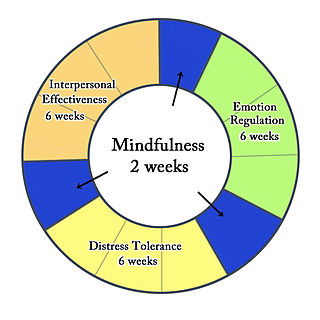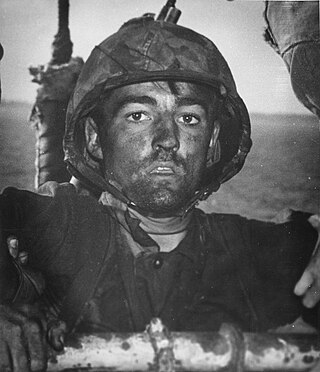Related Research Articles
Post-traumatic stress disorder (PTSD) is a mental and behavioral disorder that develops from experiencing a traumatic event, such as sexual assault, warfare, traffic collisions, child abuse, domestic violence, or other threats on a person's life or well-being. Symptoms may include disturbing thoughts, feelings, or dreams related to the events, mental or physical distress to trauma-related cues, attempts to avoid trauma-related cues, alterations in the way a person thinks and feels, and an increase in the fight-or-flight response. These symptoms last for more than a month after the event and can include triggers such as misophonia. Young children are less likely to show distress, but instead may express their memories through play. A person with PTSD is at a higher risk of suicide and intentional self-harm.

Dialectical behavior therapy (DBT) is an evidence-based psychotherapy that began with efforts to treat personality disorders and interpersonal conflicts. Evidence suggests that DBT can be useful in treating mood disorders and suicidal ideation as well as for changing behavioral patterns such as self-harm and substance use. DBT evolved into a process in which the therapist and client work with acceptance and change-oriented strategies and ultimately balance and synthesize them—comparable to the philosophical dialectical process of thesis and antithesis, followed by synthesis.
Psychological trauma is an emotional response caused by severe distressing events, such as bodily injury, sexual violence, or other threats to the life of the subject or their loved ones; indirect exposure, such as from watching television news, may be extremely distressing and can produce an involuntary and possibly overwhelming physiological stress response, but does not always produce trauma per se. Examples of distressing events include violence, rape, or a terrorist attack.

Combat stress reaction (CSR) is acute behavioral disorganization as a direct result of the trauma of war. Also known as "combat fatigue", "battle fatigue", "operational exhaustion", or "battle/war neurosis", it has some overlap with the diagnosis of acute stress reaction used in civilian psychiatry. It is historically linked to shell shock and can sometimes precurse post-traumatic stress disorder.
Eye movement desensitization and reprocessing (EMDR) is a form of psychotherapy that is a recommended treatment for post-traumatic stress disorder (PTSD), but remains controversial within the psychological community. It was devised by Francine Shapiro in 1987 and originally designed to alleviate the distress associated with traumatic memories such as PTSD.
Acute stress reaction (ASR), also known as psychological shock, mental shock, or simply shock, and acute stress disorder (ASD), is a psychological response to a terrifying, traumatic, or surprising experience. Combat stress reaction (CSR) is a similar response to the trauma of war. The reactions may include but are not limited to intrusive or dissociative symptoms, and reactivity symptoms such as avoidance or arousal. It may be exhibited for days or weeks after the traumatic event. If the condition is not correctly addressed, it may develop into post-traumatic stress disorder (PTSD).

Complex post-traumatic stress disorder is a stress-related mental and behavioral disorder generally occurring in response to complex traumas.
Childhood trauma is often described as serious adverse childhood experiences. Children may go through a range of experiences that classify as psychological trauma; these might include neglect, abandonment, sexual abuse, emotional abuse, and physical abuse. They may also witness abuse of a sibling or parent, or have a mentally ill parent. These events can have profound psychological, physiological, and sociological impacts leading to lasting negative effects on health and well-being. These events may include antisocial behaviors, attention deficit hyperactivity disorder (ADHD), and sleep disturbances. Additionally, children whose mothers have experienced traumatic or stressful events during pregnancy have an increased risk of mental health disorders and other neurodevelopmental disorders.
Prolonged exposure therapy (PE) is a form of behavior therapy and cognitive behavioral therapy designed to treat post-traumatic stress disorder. It is characterized by two main treatment procedures – imaginal and in vivo exposures. Imaginal exposure is repeated 'on-purpose' retelling of the trauma memory. In vivo exposure is gradually confronting situations, places, and things that are reminders of the trauma or feel dangerous. Additional procedures include processing of the trauma memory and breathing retraining.
Memory and trauma is the deleterious effects that physical or psychological trauma has on memory.
Cognitive processing therapy (CPT) is a manualized therapy used by clinicians to help people recover from posttraumatic stress disorder (PTSD) and related conditions. It includes elements of cognitive behavioral therapy (CBT) treatments, one of the most widely used evidence-based therapies. A typical 12-session run of CPT has proven effective in treating PTSD across a variety of populations, including combat veterans, sexual assault victims, and refugees. CPT can be provided in individual and group treatment formats and is considered one of the most effective treatments for PTSD.
PTSD or post-traumatic stress disorder, is a psychiatric disorder characterised by intrusive thoughts and memories, dreams or flashbacks of the event; avoidance of people, places and activities that remind the individual of the event; ongoing negative beliefs about oneself or the world, mood changes and persistent feelings of anger, guilt or fear; alterations in arousal such as increased irritability, angry outbursts, being hypervigilant, or having difficulty with concentration and sleep.
Childbirth-related post-traumatic stress disorder is a psychological disorder that can develop in women who have recently given birth. This disorder can also affect men or partners who have observed a difficult birth. Its symptoms are not distinct from post-traumatic stress disorder (PTSD). It may also be called post-traumatic stress disorder following childbirth (PTSD-FC).
Rachel Yehuda is a professor of psychiatry and neuroscience, the vice chair for veterans affairs in the psychiatry department, and the director of the traumatic stress studies division at the Mount Sinai School of Medicine. She also leads the PTSD clinical research program at the neurochemistry and neuroendocrinology laboratory at the James J. Peters VA Medical Center. In 2020 she became director of the Center for Psychedelic Psychotherapy and Trauma Research at Mount Sinai.

Posttraumatic stress disorder (PTSD) is a cognitive disorder, which may occur after a traumatic event. It is a psychiatric disorder, which may occur across athletes at all levels of sport participation.

Richard Allan Bryant is an Australian medical scientist. He is Scientia Professor of Psychology at the University of New South Wales (UNSW) and director of the UNSW Traumatic Stress Clinic, based at UNSW and Westmead Institute for Medical Research. His main areas of research are posttraumatic stress disorder (PTSD) and prolonged grief disorder. On 13 June 2016 he was appointed a Companion of the Order of Australia (AC), for eminent service to medical research in the field of psychotraumatology, as a psychologist and author, to the study of Indigenous mental health, as an advisor to a range of government and international organisations, and to professional societies.
Psychotraumatology is the study of psychological trauma. Specifically, this discipline is involved with researching, preventing, and treating traumatic situations and people's reactions to them. It focuses on the study and treatment of post-traumatic stress disorder (PTSD) and acute stress disorder (ASD), but encompasses any adverse reaction after experiencing traumatic events, including dissociative disorders. Since 2021, Certified Trauma Professionals who have achieved a major level of training and clinical expertise can use the abbreviation PsyT after their names as a standard of recognition in the trauma field.

Trauma in first responders refers to the psychological trauma experienced by first responders, such as police officers, firefighters, and paramedics, often as a result of events experienced in their line of work. The nature of a first responder's occupation continuously puts them in harm's way and regularly exposes them to traumatic situations, such as people who have been harmed, injured, or killed.

Janina Scarlet is a Ukrainian-born American author and clinical psychologist. She is known for utilizing popular culture references in treating patients.
Josef I. Ruzek is a clinical psychologist specializing in post-traumatic stress disorder (PTSD) treatment, with a focus on early intervention, trauma prevention, and the application of technology to enhance treatment accessibility and effectiveness